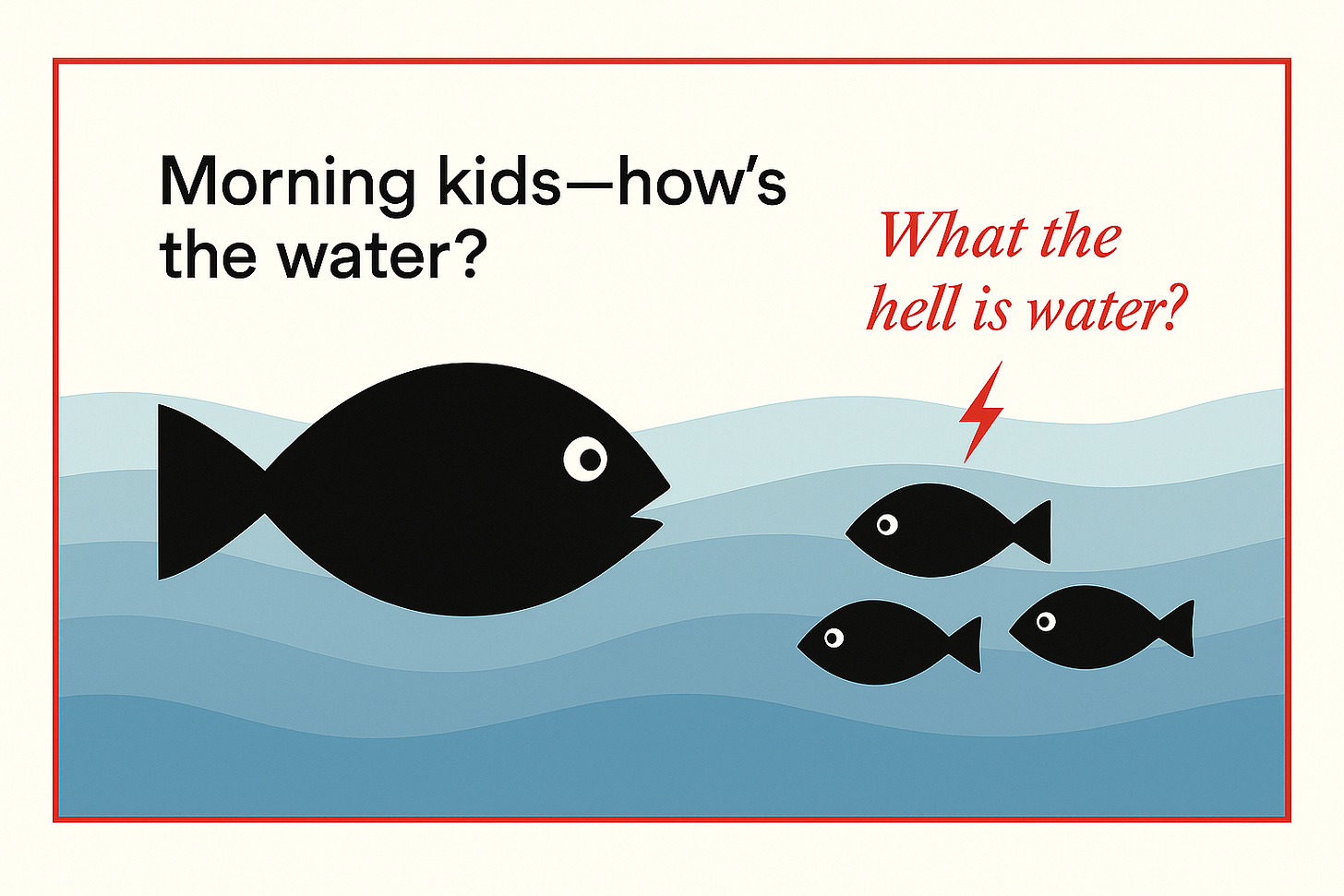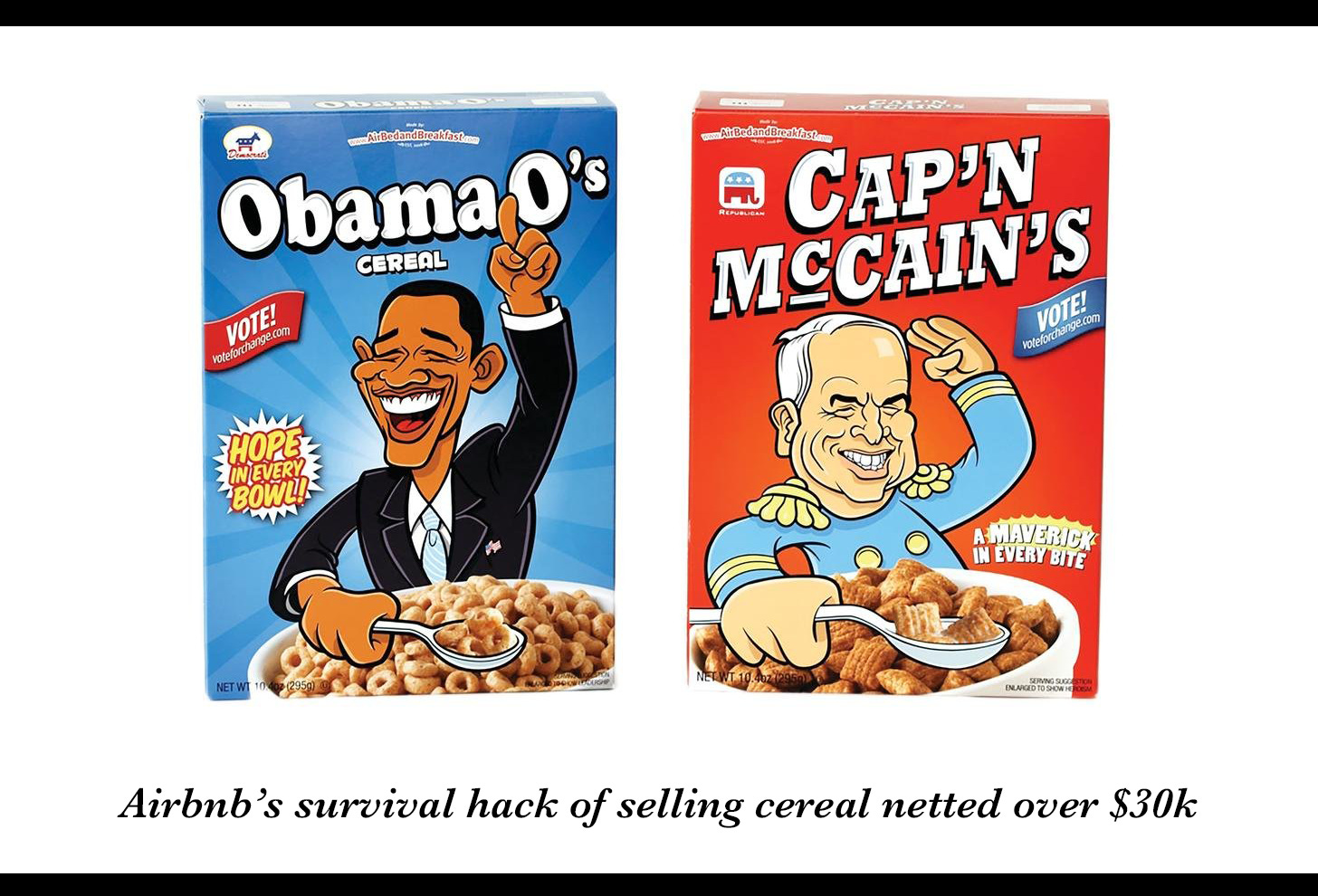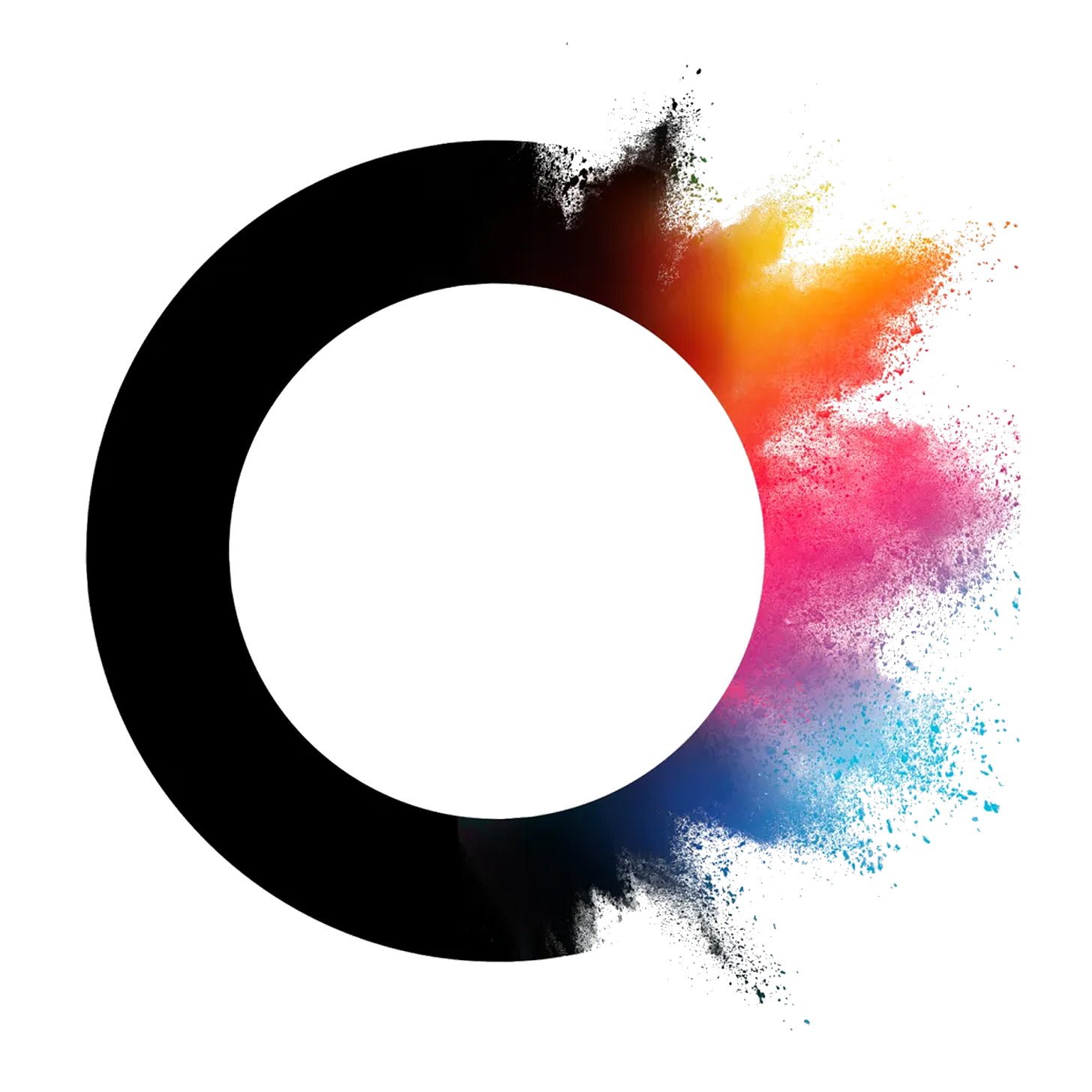What are Pattern Breakers?
Why pattern breaking ideas and actions lead to outlier startups
The Pattern Breakers book is now available wherever you buy your books.
David Foster Wallace’s commencement speech at Kenyon College in 2005 is one of my all-time favorites. He opens it with a fish story:
Wallace’s speech then builds on the idea that we constantly overlook basic realities because our minds stay in an “automatic default setting.” Much of what really happens escapes our notice, and we’re unaware of just how much slips by.
This is not always a “bad” thing. As I suggested in the Welcome to Pattern Breakers post, our brains, wired from birth, find patterns automatically. It's how we manage life's maze. Patterns bring order and safety. They save time and spare our minds of unnecessary cognitive load. We are rewarded for matching patterns well in school, in our relationships, our work, and nearly every significant part of life.
But it’s also why so few of us create breakthroughs.
Enter Pattern Breakers
Great startup founders are pattern breakers.
They develop pattern-breaking ideas that differ significantly from our usual practices. Pattern-breaking founders challenge the usual, offering fresh views and solutions that depart from old methods. To most of us, their ideas seem far-fetched, perhaps even foolish, because they're so different. Airbnb offered a completely different approach to accommodation than traditional hotels. Ridesharing introduced a brand new way for people to travel. Salesforce challenged us to rethink how we used and paid for business software.
But ideas alone don’t shape the future. Those who break the pattern must do more and take differentiated actions to make others believe. Their radical ideas clash with existing beliefs. People usually push back when their perspectives are challenged. So, pattern-breaking founders must find early believers who see the world as they do. They'll also meet harsh critics, some clinging to the old for personal gain and others who don’t want to change.
Pattern-breaking Ideas
Pattern-breaking ideas challenge established norms and require people to step out of their comfort zones. At first, they can sound absurd. Staying in a stranger's house or riding in a stranger’s car? But look at Airbnb, Uber, and Lyft. They made these odd notions common. And who would have thought that brief, 140-character messages would change how we create and consume media?
These groundbreaking ideas don't fit the usual mold, but that’s their strength. They can’t be compared to anything that’s come before. By embracing assumptions that diverge from the norm, they often escape competition entirely.
Counterintuitively, experts are especially prone to missing the possibility of change that's right in front of them. Often, it's the outsider, not tied to old rules, who spots a new path.
The breakthrough of human flight is a perfect example.
Orville and Wilbur Wright, without formal training in physics or aeronautics, showed the strength of independent thought needed for a breakthrough. They owned a bicycle sales and repair shop in Dayton, Ohio, and the principles they observed in balancing and steering bicycles significantly contributed to their eventual understanding of flight control.
But what did the “experts” think about the Wright Brothers’ efforts?
In 1903, The New York Times predicted that human flight would take one to ten million years to achieve. An article bearing the title "Flying Machines Will Not Fly" closed with a bleak assessment: “To the ordinary man, it would seem as if effort might be employed more profitably.”
Fortunately, the Wright Brothers weren’t ordinary. Sixty-nine days after the article was published, they flew their first plane in Kitty Hawk, North Carolina.
Today, we talk about making strides in space exploration. Ironically, the early strides in this field followed a similar path. Not long after the milestone of human flight, Robert Goddard started his experiments with rockets. In January 1920, he penned "A Method of Reaching Extreme Altitudes," outlining his rocket theories and the possibility of reaching the moon.
A New York Times editorial, "A Severe Strain on Credulity," sounded like deja vu. They rebuked his ideas, claiming, "Professor Goddard…does not know the relation of action to reaction and of the need to have something better than a vacuum against which to react." Goddard was dismissively criticized as someone who "seems to lack the knowledge ladled out daily in high schools."
Goddard successfully launched his first rocket on March 16, 1926, which ushered in an era of space flight and innovation. He and his team launched 34 rockets between 1926 and 1941. Today, NASA's "Goddard Space Center" employs over 10,000.
While conventional experts ‘knew’ that human flight and rocketry were impossible based on established science, the Wright brothers and Robert Goddard proved the conventional wisdom wrong. What they lacked in credentials, they more than made up for with their passion for independent thinking and sheer determination. This will to question, the refusal to accept the current patterns of thinking, spurred them on. And so, they changed people’s reality and created the impossible.
Spotify founder Daniel Ek once shared a George Bernard Shaw quote with me that fits this idea perfectly:
Shaw understood a profound truth. It's not the "reasonable" who change the world. True progress comes from the "unreasonable" – those who don't conform but instead reshape the world.
Pattern-breaking Actions
Pattern breakers don’t just think differently; they act on their thoughts in different ways.
To make a breakthrough real, you can’t just think unconventionally; you must also act unconventionally. Think of this like George Costanza in that famous Seinfeld episode where he does the opposite of every natural inclination he has, yet things work out for him better than if he had followed his natural habits.
I've witnessed many actions that defied normal business practices, appearing crazy but ultimately successful. Emmett Shear and Justin Kan of Justin.tv/Twitch sold their earlier startup, Kiko, on eBay. Airbnb financed its early days by selling cereal boxes with Obama and McCain on them during the 2008 Presidential election. Ridesharing companies constantly battled legal issues wherever they went.
But doing things differently is part of the game. Startups that break patterns stir things up. They challenge the known and move people from today's certainty to tomorrow's unknown. That's hard to do, and most people resist since they are content with the here and now. Many will even fight you and your new idea, hoping you fail.
Adding to the challenge is the constant pressure to fit in. Just as society conditions us to think in conventional ways as we grow up, it also conditions us to act in conventional ways to feel a sense of belonging.
Many of us seek status and belonging without even seeing it; we find it hard not to react to what others are doing, especially those we have been programmed to want to impress. We’re reactive without realizing it. We put limits on ourselves because we buy into other people’s rules. It’s the fundamental limit I’ve observed in most people, including myself and most founders: they define success by succeeding according to the rules that others have defined.
But pattern-breaking founders dare to reject the need to enhance their status or approval if it conflicts with the insight they have discovered about the future.
Here’s how John Zimmer described his experience at Lyft, a company we funded in the seed stage when it was called Zimride: “We kept going because we really believed in our mission. I don’t know if we would have thrown in the towel unless they were to lock us up.”
They were willing to launch the Lyft service despite the risk of being declared illegal. For a time, they got cease and desist letters every day. But they didn’t get locked up. Thankfully, they didn’t cease or desist.
Brian Chesky and his co-conspirators scraped Craigslist against their terms of service rules in the early days because they needed to find people who were already willing to rent extra rooms or their second homes. If you think Craigslist didn’t love this idea and made their dislike of it clear, you would be right. In a future post, I’ll tell the embarrassing story of how I passed on Airbnb— the most giant whiff of my career
All these people dared to be disagreeable. Pattern-breaking founders must choose to prioritize their mission for the long term, even if it means that the present will attack their status or sense of belonging in the short term. It takes courage to be the type of founder who is brave enough to think, feel, and act differently. Lots of people in the business world are persistent, but very few share the radical determination I have observed in the startup founders who ultimately break the mold.
Note: Daring to be disliked is not a permission slip to be a jerk. That’s probably a discussion worthy of a future post.
What are your Favorite Examples?
For better or worse, I'm obsessed with studying startups that break the mold. I'm always looking to learn about more cases of unconventional ideas and actions that led to breakthroughs.
Do you have favorite examples? Any ideas that break the pattern, that stir something in you? Actions by founders, bold and creative, that caught your eye? I'm always looking for more examples of such greatness.
I’m also eager to hear about people’s reactions to these ideas and other questions they might raise.
Next week, I'll explore learnings from ideas that break patterns. What sets them apart from other startup ideas? How can we stay alert to the chance that a seemingly bad idea might be great? And how do we steer clear of ideas that seem good but won't lead to a breakthrough worth the intense sacrifices needed to build an exceptional startup? This is one of my favorite mysteries of the startup world.
See you next week!









Hello Mike, this particular post has resonated with me deeply. Thank you for posting 😊 We've been building a platform to transform lifelong learning and break all the current patterns! As you outlined, we have challenges but we are pushing forward! We know that building a different future demands deep commitment! So what are we working on? The world is naturally overly excited about AI, however we are thinking about the human capital development in the presence of AI. We believe AI driven economy will pose serious threats to the human capital development. A continuous lifelong learning will become mandatory. Hence, we are building a platform akin to Roblox for Corporations and Duolingo. Pure game based learning platform with its own learning framework. With Apple Vision Pro and other platform, we are very excited about the future! We already have a few financial instutions interested in B2B PoCs. We'd be interested in connecting with you. Thank you! Kaya
I’d be curious to hear your thoughts. Why is it that established companies cannot be pattern breakers?
It seems like the market likes pattern breakers, unless you are an established company. Then they just want more of the pattern.